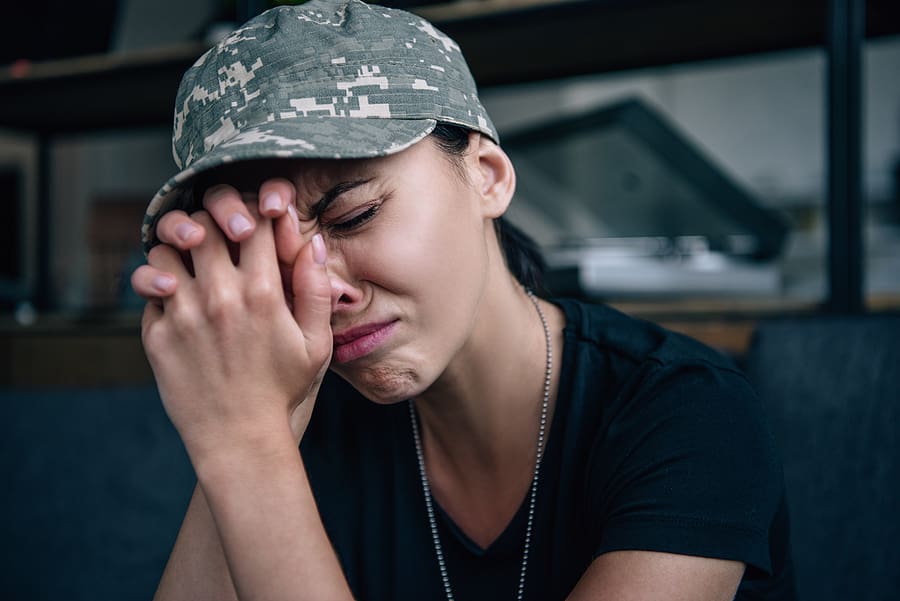
New Study Shows Prevalence of Anxiety in Military Vets | VetLaw
Researchers have found evidence that suggests increased rates of anxiety among veterans, especially those who are at a greater risk for experiencing traumatic events.
Summary
- Emerging research warns that the pervasiveness of anxiety in military veterans presents a threat to their well-being and requires action.
- There are several types of anxiety disorders, but researchers believe that even mild anxiety in veterans should be taken seriously due to its ties to suicidal thoughts and actions.
- Veterans who have experienced trauma or recognized they were at a greater risk of being targeted may be more likely to have anxiety.
- VA anxiety disability claims can help veterans manage medical expenses, lost income, and other costs.
Mental health conditions like anxiety have long been the subject of public criticism and skepticism, including within institutions like the military. Too often, this stigma has interfered with vets receiving the care they need.
A recent study examining the prevalence of anxiety in military veterans underscores the importance of overcoming this issue so vets can access VA disability benefits.
Our team at VetLaw strives to support veterans with anxiety as they seek disability benefits in VA mental health claims. Reach out to the VA-accredited attorneys of VetLaw about scheduling a free consultation by calling us at (855) 500-4672 or filling out a contact form today.
Researchers From Yale and the VA Identify Concerning Trend of Anxiety in Military Veterans
A new study, led by Grace Macdonald-Gagnon and Robert H. Pietrzak, has uncovered patterns among military vets with anxiety. The researchers relied on data from the 2019-2020 National Health and Resilience in Veterans Study to explore conditions that contributed to anxiety in military veterans.
Perhaps unsurprisingly, military veterans were more likely to exhibit symptoms of anxiety as compared to the civilian population. Nearly 8% of the veterans in the study reported symptoms associated with Generalized Anxiety Disorder (GAD), which is approximately 2.5 times the rate of GAD among civilians.
Another notable finding from this study was that mild anxiety in veterans appears to have a greater impact than expected, given the relatively low severity of the symptoms.
The lead researcher highlighted that mild anxiety in veterans demonstrated a correlation “with elevated rates of co-occurring psychiatric and functional difficulties, as well as suicidal thoughts and behaviors”.
Common Symptoms of Anxiety in Military Veterans
While the idea of “having anxiety” is often used in a casual context to convey feelings of nervousness or unease, in a clinical sense, anxiety is a serious mental health condition recognized by the DSM-5. The VA also provides disability benefits for anxiety conditions.
There are several types of anxiety disorders, but the study led by Macdonald-Gagnon and Pietrzak mostly focused on Generalized Anxiety Disorder. Veterans may experience a range of physical and psychological symptoms with GAD, such as:
- Insomnia
- Exhaustion
- Uncontrollable shaking
- Muscle cramps
- Headaches
- Stomach pain and nausea
- Irritability and moodiness
- Jumpiness and an overactive startle response
- Hot flashes and excessive sweating
- Trouble focusing on tasks
- Stress that is disproportionate to the situation
- Frequent urination
- Breathing difficulties
- Feeling like there’s a lump in your throat
- Lightheadedness
- Feeling tense or on edge
What sets Generalized Anxiety Disorder apart from feeling anxious is three things: frequency, persistence, and severity of symptoms. A formal anxiety diagnosis usually requires that the patient experiences anxiety most days, over a six-month period or longer, to the point that it negatively impacts daily life.
Which Veterans Are Most Likely to Suffer From Generalized Anxiety Disorder?
According to the research study of anxiety in vets, certain populations are more likely to develop anxiety based on their experiences or personal characteristics. Risk factors for anxiety in military veterans include the following:
- Young
- Female
- Racial or ethnic minority
- Served multiple deployments
- Combat experience
There is an overlap between risk factors for anxiety among vets and risk factors for Military Sexual Trauma. Demographic characteristics, such as being younger and female, are associated with a higher risk of suffering Military Sexual Trauma.
In effect, the groups that have the strongest correlation with anxiety are vets who have been deployed, those who have seen combat, and those who are more likely to have survived MST. This emphasizes the role that experiencing trauma has in causing anxiety in military veterans.
Claiming Anxiety as a Service-Related Disability With the VA
Anxiety can be a debilitating condition that makes it difficult to function, let alone maintain relationships, hold a steady job, and enjoy life. VA disability benefits can cover the cost of prescriptions, therapy, lost wages, and more. Vets who struggle with service-related anxiety must submit proof of the following to the VA to be eligible for disability benefits:
- Establish your status as an eligible veteran
- Show that you were clinically diagnosed with Generalized Anxiety Disorder, Social Anxiety, or another type of anxiety disorder
- Demonstrate a service connection between your anxiety disorder and an event or circumstances you experienced during your military service
Your VA disability rating for service-connected anxiety will depend on which diagnostic criteria apply to your condition. In most cases, the more debilitating your anxiety is, the higher your VA disability rating will be.
If you are filing a VA disability benefits claim based on more than one mental health issue, note you will be assigned one mental health disability rating.
Trust the Expertise of VetLaw For VA Anxiety Disability Claims
With treatment and support, veterans with anxiety can reclaim their lives. At Vet Law, we want to be a part of that process. We will vocally and relentlessly advocate for your veterans anxiety disability claim.
Our veterans disability benefits denial attorneys have an established record of excellence when it comes to dealing with the VA, which is why our clients rely on our skills to secure the benefits they are entitled to. You can reach us at (855) 500-4672 or fill out a contact form to schedule a free consultation.
Frequently Asked Questions
Could my gastrointestinal issues and anxiety be related?
Every day, scientists discover new information about the gut-brain connection. Currently, there is compelling evidence to suggest that gastrointestinal issues are related to mental health.
If you are experiencing anxiety and digestive problems, your gut bacteria may be off-balance which can impact the neurotransmitters that play a role in anxiety. Check with your provider if you are concerned that your conditions are linked.
Can I claim Generalized Anxiety Disorder as a Secondary Condition?
If you have a service-related disability, such as PTSD, thyroid issues, traumatic brain injury, or depression, and you develop GAD as a result of that health issue, you may be able to claim it as a Secondary Condition.
A VA disability appeals attorney can help you gather evidence that your anxiety was brought on or aggravated by your service-related illness or injury to secure benefits for your Secondary Condition.
What are the types of anxiety disorders?
The anxiety disorders that most commonly impact military veterans include:
- Generalized anxiety disorder
- Panic disorder
- Specific phobias, such as agoraphobia
- Social anxiety disorder
- Obsessive-Compulsive Disorder (OCD)
Anxiety can often be comorbid with other mental health conditions, including depression, PTSD, and adjustment disorder. Check with your veterans disability claims lawyer to see if the VA offers disability benefits for your specific issue.



